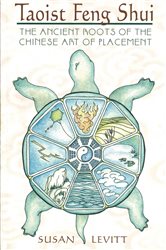
Taoist Feng Shui | Free Book

The Ancient Roots of the Chinese Art of Placement
• The first book to explain how feng shui developed from the Taoist
systems of astrology, yin and yang, and the five elements.
• Provides a background on Taoist philosophy to help readers better understand the principles of feng shui and how to use them properly.
• Helps readers improve home, business, garden, property, neighborhoods, and much more.
The Chinese art of feng shui has become extremely popular in the West, but too often advice on the subject consists of overly simplistic instructions for rearranging one's house without any explanation of the profound philosophical system behind these changes. The ancient Taoists developed feng shui from their understanding of the subtle interplay of energies that make up the universe, and no true mastery of feng shui is possible without a knowledge of Taoism. Taoist Feng Shui provides step-by-step guidelines for improving your home, business, garden, property, and neighborhood using this ancient system of knowledge.
In Taoist Feng Shui, Susan Levitt traces the history of feng shui and shows how it is grounded in knowledge of yin and yang and the five Taoist elements of fire, earth, metal, water, and wood, as well as many other principles essential to Taoism. Once a background in Taoism is established, readers can better understand the philosophy behind concepts such as choosing the best colors for each room of the home, room-by-room furniture placement, yin and yang balance, correct lighting, outdoor landscaping, the function of hallways and entrances, and the proper use of mirrors, crystals, fountains, and other feng shui tools. With in-depth examples from the author's private feng shui practice, Taoist Feng Shui can help all readers transform their personal environments to create peace, harmony, health, wealth, and good fortune.
• Provides a background on Taoist philosophy to help readers better understand the principles of feng shui and how to use them properly.
• Helps readers improve home, business, garden, property, neighborhoods, and much more.
The Chinese art of feng shui has become extremely popular in the West, but too often advice on the subject consists of overly simplistic instructions for rearranging one's house without any explanation of the profound philosophical system behind these changes. The ancient Taoists developed feng shui from their understanding of the subtle interplay of energies that make up the universe, and no true mastery of feng shui is possible without a knowledge of Taoism. Taoist Feng Shui provides step-by-step guidelines for improving your home, business, garden, property, and neighborhood using this ancient system of knowledge.
In Taoist Feng Shui, Susan Levitt traces the history of feng shui and shows how it is grounded in knowledge of yin and yang and the five Taoist elements of fire, earth, metal, water, and wood, as well as many other principles essential to Taoism. Once a background in Taoism is established, readers can better understand the philosophy behind concepts such as choosing the best colors for each room of the home, room-by-room furniture placement, yin and yang balance, correct lighting, outdoor landscaping, the function of hallways and entrances, and the proper use of mirrors, crystals, fountains, and other feng shui tools. With in-depth examples from the author's private feng shui practice, Taoist Feng Shui can help all readers transform their personal environments to create peace, harmony, health, wealth, and good fortune.
In The Press
"Shares just enough Taoist history to make her book an interesting read, but not so much that the reader is confused about the connection between the history and its application to the art of placement. This text offers the reader opportunities to delve into personal attributes, behaviors, likes and dislikes."
Also read:
- Divorcing a Real Witch | Free Book
- Isis in America | Free Book
- La Ciencia de la Mente | Free Book
- Mindfulness at Work For Dummies | Free Book
- Pioneering the Possible | Free Book
- Poison Pen Letters to Myself | Free Book
- Teen Spirit Guide to Modern Shamanism | Free Book
- The New Book of Shiatsu | Free Book
- Title: Taoist Feng Shui | Free Book
- Author: Steven
- Created at : 2024-12-01 04:25:03
- Updated at : 2024-12-07 05:14:14
- Link: https://novels-ebooks.techidaily.com/95782749-9781594775826-taoist-feng-shui/
- License: This work is licensed under CC BY-NC-SA 4.0.
